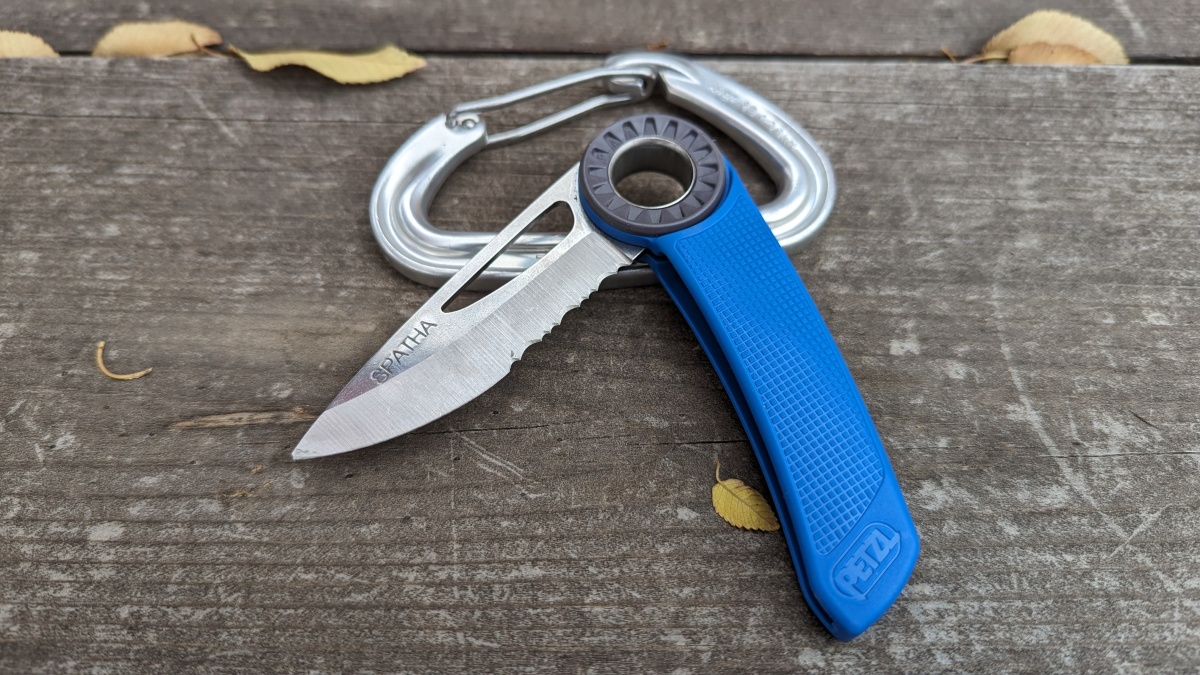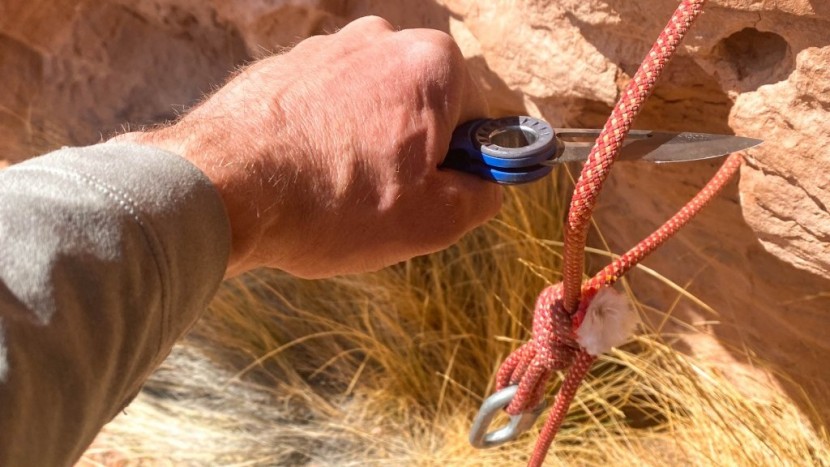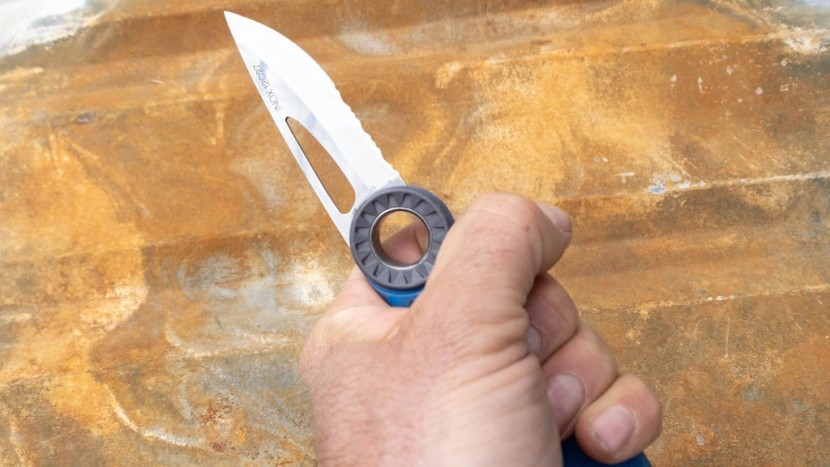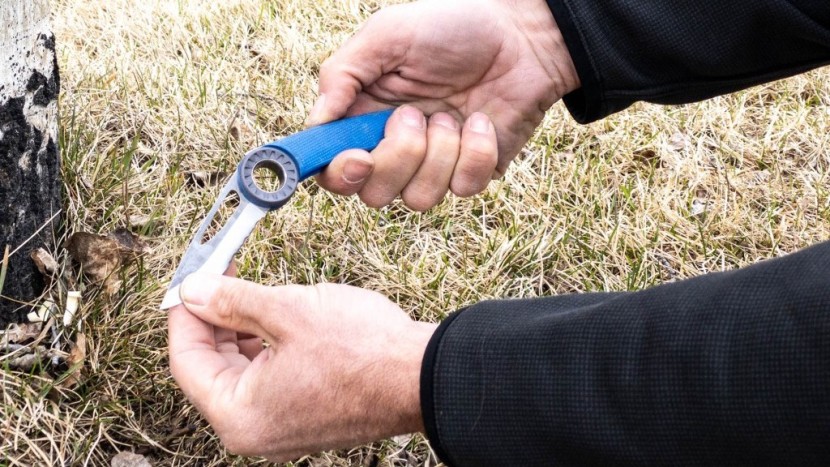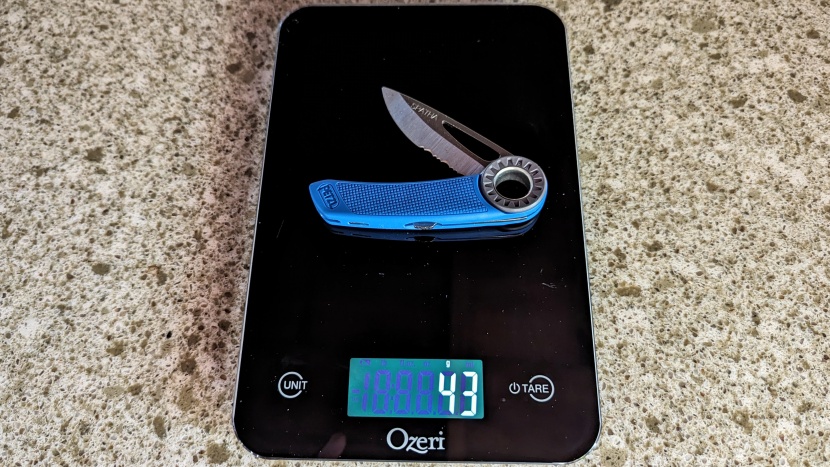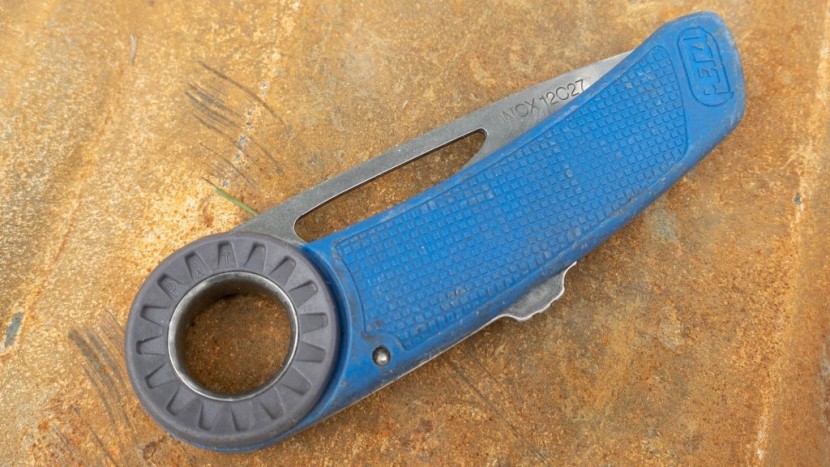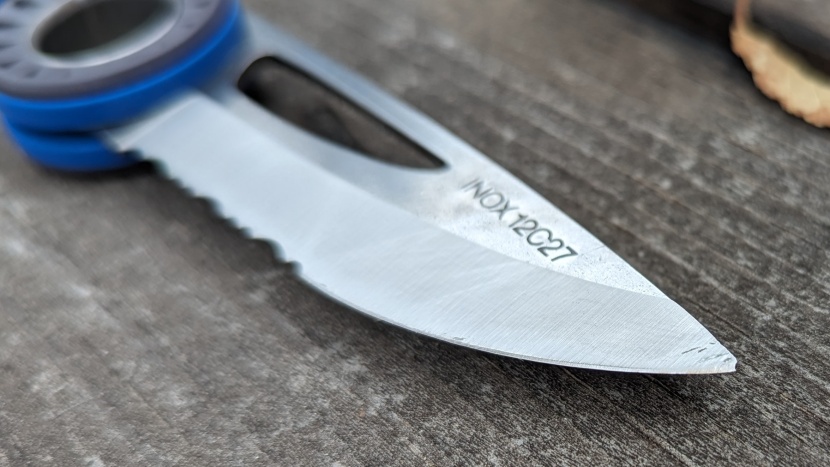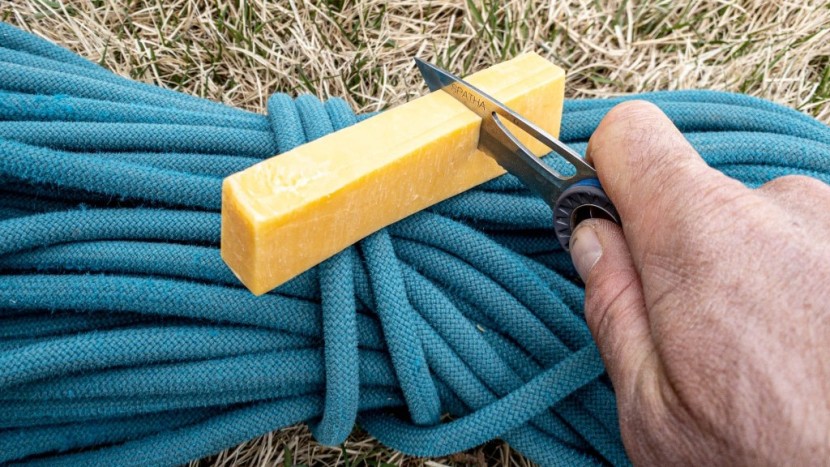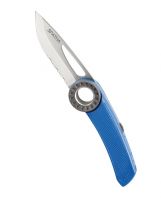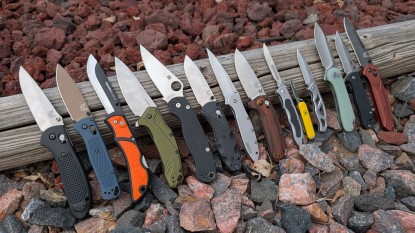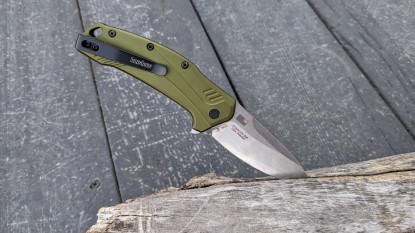
Our Verdict
Our Analysis and Test Results
The Spatha is a knife designed specifically for climbing. This means that it is built to be carried on a carabiner, is relatively lightweight, and includes a serrated section of the blade for cutting rope and webbing. The fact is that, even if you carry it only while climbing, you will likely use it for non-climbing specific purposes most of the time. The members of our testing team that climb a lot can assert that cutting rope and webbing is a very rare part of most climbers' days. Worry not, as the Spatha is also a serviceable “regular” pocket knife.
Blade and Edge Integrity
Petzl easily could have “phoned it in” on the blade and edge of the Spatha. A specialized, seldom-used tool like this doesn't have to have a great blade. Thankfully, they put a great blade in it. The Scandinavian 12C27 steel is stamped right on the blade, alongside the qualifier “inox.” "Inox" is the French abbreviation for “stainless” steel; short for “inoxydable” or “not oxidizable,” it means that it's resistant to rust. Petzl's European loyalties are clear: Scandinavian steel and French abbreviations are well-regarded. It is nothing flashy but has been shaped into great blades for decades all through Europe.
The Spatha has a half-straight, half-serrated blade. Generally, for day-to-day pocket knives, we like fully straight blades. A straight edge is easier to maintain and more versatile than a serrated one. A straight edge does everything a serrated edge does, but the opposite is not true. A serrated edge is marginally better at cutting cordage than a straight edge, especially with equal (especially, equally poor) edge maintenance.
A dulled serrated edge will hack through rope and webbing better than a dulled straight edge. Because it is optimized for rope-intensive settings, we like the serrated section of the Spatha blade. This is officially the only application where we recommend a serrated section. For any other purposes, choose a straight blade and keep it sharp. If anything, own more than one knife. Own this one for climbing only and own another, with a fully straight blade, for day-to-day and non-climbing adventures. We feel strongly about serrated sections in your blade edge; avoid them except for rope-intensive applications.
Ergonomics
The Spatha blade is full-sized, the handle is relatively thin and low profile, you can open the blade with one hand (with either thumb, in the blade's cutout) or with the ribbed hinge ring, and the blade locks open with a traditional “lockback” bar. None of these ergonomic matters are on the leading edge, but they all do the job and make sense in this application. Perhaps the most interesting thing about the knife ergonomically is the large ribbed ring you can use to open the Spatha. This is readily manipulated with gloves on. No other knife we've used is as easy to open with gloves on. We like this, even for purposes not climbing-related.
The traditional lockback mechanism isn't very sophisticated and is prone to developing more play than other modern solutions. However, with the huge hinge, carabiner hole, and opening “traction ring,” the lockback configuration makes sense and is likely the only feasible solution. In all but the most extensive, robust use, the lockback will do just fine. Like the opening ring, the lockback can be manipulated with gloves better than other options.
Portability
The Petzl Spatha weighs 1.5 oz and, when closed, measures 4.2 x 0.5 inches. The dimensions are pretty typical for a full-function pocket knife, but that weight is remarkably low. Of the knives we tested, all those that are close in weight are much, much smaller. Petzl's choice of an almost all plastic handle and a relatively thin blade comes with weight savings. Like any pocket knife, you can carry the Spatha loose in a pocket or bag. Further, the hinge/opening ring has a huge hole in the middle of it for clipping to a carabiner. So clipped, it hangs with gravity (plus the friction in the hinge), keeping the blade closed and dangles minimally low on your harness. This is great.
A knife handy on your harness is a good thing in some climbing settings. Note that all that keeps the knife closed is friction in the hinge. Given that at least some of the hinge surface is plastic-on-metal, you might anticipate this hinge friction to degrade. Our team has carried versions of the Spatha for years with no important friction loss. However, this long-term test finding has had limited actual use of the knife. It is conceivable that a Spatha, if deployed extensively and regularly, could develop play and lose more friction than a typical pocket knife. But through the years, we have yet to experience this potential pitfall.
Construction Quality
The first impressions of our testers with the Spatha, accustomed to sturdy, everyday pocket knives, were relatively unremarkable. The all-plastic handle, somewhat rough hinge friction, primitive lockback design, and low weight combine to leave our test team somewhat underwhelmed at first glance. Long-term use indicates that the Petzl Spatha will hold up just fine. As noted above, there is good reason to believe that the hinge may lose friction and risk the blade opening inadvertently. We have not found that to be the case, but we will continue investigating.
Should You Buy the Petzl Spatha?
The Petzl Spatha is the knife we currently recommend for climbers. Its full-size stature is handy for many tasks beyond cutting rope and webbing. Its construction, materials, and portability are carefully balanced for optimum application in steep terrain. Considering function and versatility, the Spatha is relatively inexpensive. You can spend this amount on a daily-carry knife and get better materials, construction, and ergonomics. But you can't do better at any price for climbing purposes, especially for a knife that is more than adequate for everyday applications.
What Other Pocket Knives Should You Consider?
Our test team has used other knives while climbing, but the Spatha is by far the best climbing-specific option we've come across. Of course, we recognize that not everyone spends much of their free time hanging from ropes. At this price point, consider weighing this knife against the Leatherman Skeletool KB. But for an overall balance of value and performance, our recommendation is the Kershaw Leek.
| Awards | |
|---|---|
| Price | $44 List Check Price at Backcountry |
Overall Score  |
|
| Star Rating | |
| Bottom Line | The best knife we have tested for rock, ice, and alpine climbing |
| Pros | Serrated blade portion, carabiner carry option, lightweight, good blade steel |
| Cons | Rudimentary construction, primitive lockback |
| Rating Categories | Petzl Spatha |
| Blade and Edge Integrity (30%) | |
| Ergonomics (25%) | |
| Portability (20%) | |
| Construction Quality (25%) | |
| Specifications | Petzl Spatha |
| Blade Style | Drop point, hybrid plain/serrated edge |
| Blade Length | 2.70 in |
| Blade Material | Sandvik 12C27 stainless steel |
| Weight | 1.50 oz |
| Length Closed | 4.20 in |
| Length Open | 7.00 in |
| Closed Thickness w/o Pocket Clip (Measured) | 0.50 in |
| Blade Thickness | Not Listed |
| Closed Blade Lock | No |
| Open Blade Lock Mechanism | Lock back |
| Handle Material | Nylon |
| Opening Style | Ambidextrous thumb hole; ridged traction ring |
| Carry Style | Carabiner hole |
| Other Features Or Functions | None |


